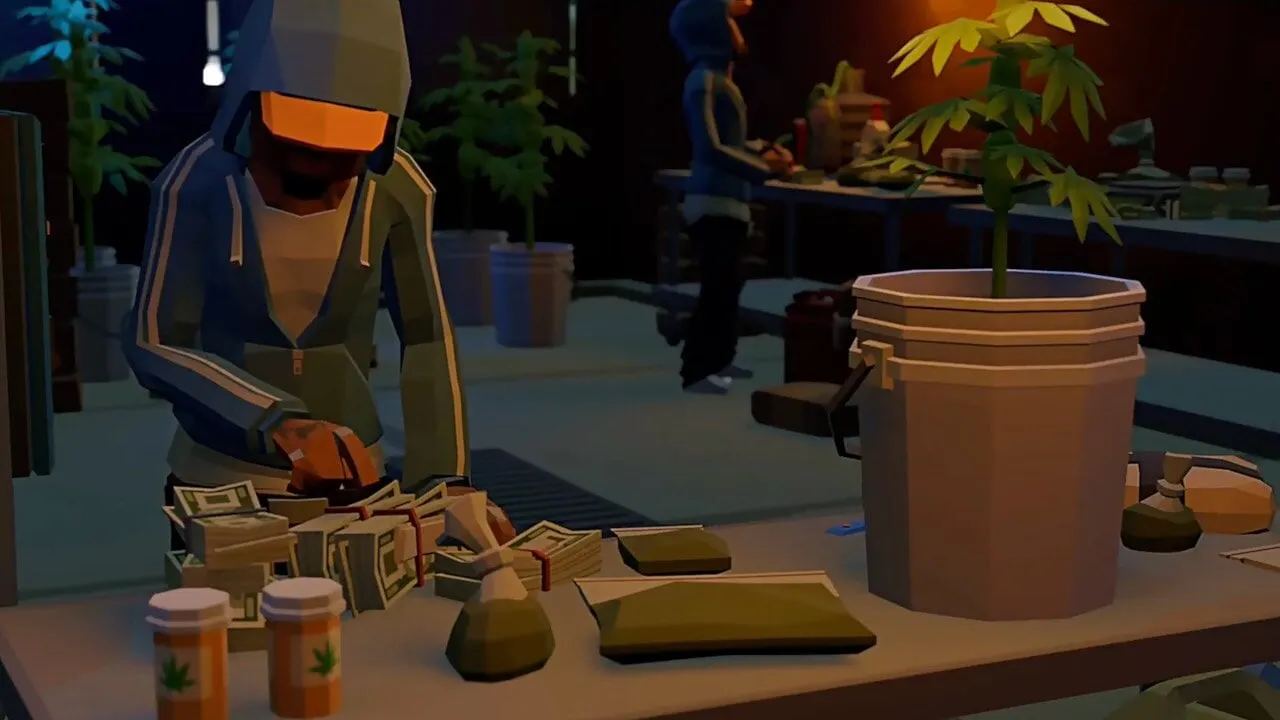In brief
- Addicted is a Solana-based cannabis farming simulator that pays users in WEED tokens.
- Players have taken to social media to brag about their crypto earnings as the price of WEED surges.
- However, the play-to-earn format has drawn claims that Addicted is a "Ponzi game."
Addicted, a Solana-powered cannabis farming simulator described as “unhinged” by its creators, has attracted the eyes of the crypto gaming community as players boast about dizzying play-to-earn gains via a skyrocketing token.
Players are invited to build and grow their own on-chain drug empires in Addicted, after paying 0.5 SOL (approximately $110) to purchase their first digital cannabis plant. The virtual farms yield WEED tokens for players based on their “grow power,” determined by how many plants a farm has and how rare they are. These tokens can be used to purchase farm upgrades and packs that contain seeds of various rarities.
As a result of Addicted’s fiendish launch—boosted by a repost from the official Solana X account—the WEED token soared to a peak market capitalization of $82.48 million. It has since fallen 36% to $52.6 million, according to DEX Screener.
Addicted is now live on Solana.
we're building the most unhinged simulation game on the internet.
get in now: https://t.co/ZC1bHtvBFS
reply for an invite code. pic.twitter.com/eaXJ3oJGoO
— Addicted (@addicteddotfun) September 30, 2025
“My yield grow power output was like 1,200. After I ripped new packs on my second day and got rare strains, my grow power went to 12,000. At peak market cap, give or take, that’s $10,000 a day in yield,” crypto trader and Addicted player Tyler Stockfield, better known as Anon online, told Decrypt. He conceded that the value fluctuates with the token’s price, along with broader in-game dynamics.
Stockfield isn’t alone in boasting about wild gains for playing the game, although he appears to be making more than others—thanks to packing rare strains. Pump.fun livestreamer Richard Podgurski claims to have enough grow power to potentially earn $5,000 a day, after unpacking a two “Unicorn Poop” super rare strains, while X user Fetakii claims to have earned approximately $629 worth of WEED in their first 12 hours of playing.
Being an early adopter to @addicteddotfun pays off. Ripped 2 Super Rare Unicorn Poop strains for my level 2 empire live on stream. Currently farming 22k $Weed per day [ which is about $5k at current prices ] pic.twitter.com/BY9YKFNgo9
— Live (@livetwitchsol) October 1, 2025
Such massive gains from less than 48 hours' worth of gaming have led to players referring to Addicted as another "Ponzi game"—a more or less playful term that's used to describe the sort of crypto game in which players can expect potentially large short-term gains, but very little long-term value.
“Yes, you do have an advantage if you are earlier, which would resemble that of a Ponzi, but based on their cool-down features and their halving cycle… I think they're doing what they can to make this fair and sustainable,” Stockfield said.
He explained that players are limited on how many packs they can open via a daily cool-down feature, and that reward size is halved every seven days. This appears to be an attempt to lengthen the game’s lifecycle. According to the game’s documentation, it is also looking to add new game mechanics, including a “War Zone,” which is likely to mix up the dynamics.
Addicted developer Pandemic Labs did not respond to Decrypt’s request for comment.
This isn’t the first crypto title to be branded a “Ponzi game” by players and observers alike.
In April, an Abstract-based crypto mining simulation game called Bigcoin caught the industry’s attention, with its token hitting a massive peak $172 million market cap, per DEX Screener. When Bigcoin was hot, players similarly calculated how much they were potentially earning each day, and boasted about those gains across social media.
But when Bigcoin's token crashed 83% in a single day, those earnings were hardly worth bragging about any longer.
Bigcoin prompted a stream of similar “Ponzi games” to roll out afterwards, with players itching for another chance at gaming fortunes. Stockfield said he’s aware of other “Ponzi-style games” that are preparing to launch, following Addicted’s success, and predicts that many more will try to capture the same kind of hype.
And he welcomes it as a new trend—and an alternative to trading meme coins.
“This is a healthy and warranted culture shift in the crypto market, in the ‘trenches of Solana.’ People are exhausted of bundled, vaporware meme coins that are often set up in a way that they were never meant to last,” Stockfield told Decrypt.
According to a Wednesday report from Galaxy Research, Solana meme coins are only being held for a median time of 100 seconds—down from 300 seconds a year ago—as traders buy, sell, and move on to the next potential big thing.
Stockfield said that Addicted appears to be more "fun and community-oriented" than trading in the meme coin trenches, and that he believes it's "more aligned with blockchain" than flipping memes.
"I really think that this is going to attract more people to have positive experiences,” he finished. “And yes, there will be people that inevitably buy the top and lose a little bit of money as well—all part of the game we play every day in crypto.”

